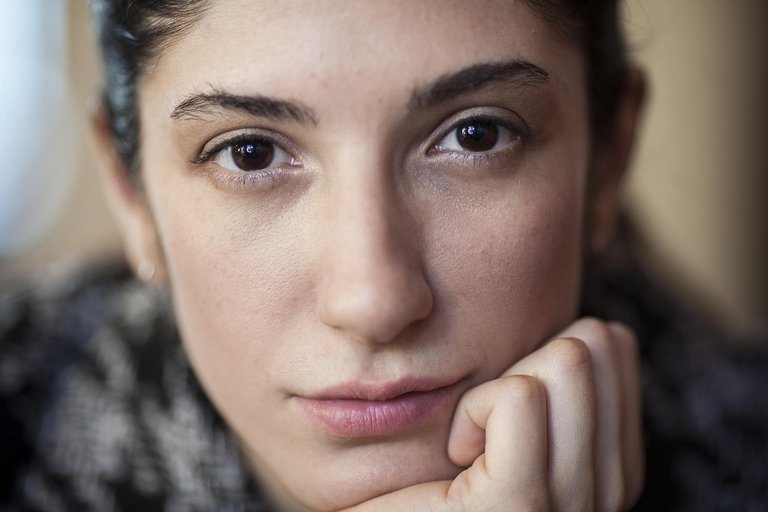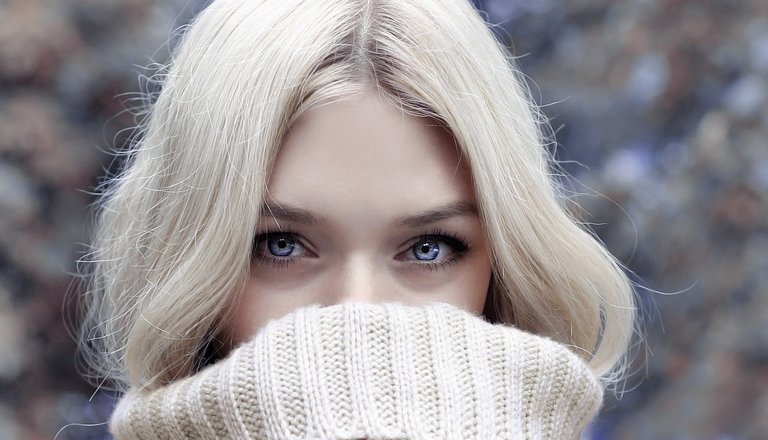Subjective beauty / La belleza subjetiva (eng-esp)
Hello, friends in #hive.
Beauty, like money, is something we've all been concerned about, like a kind of love we come to hate and love at intervals.
At intervals, it's been associated with goodness, or evil. Scorn it, and it will return, with indifference or the contempt of others in revenge. It's demanding, competitive, and compelling.
To the horror of many, it withers with age, until we're left to say we carry it inside. But by then, it must have done its job.

The curious thing about beauty is that it's there even before we realize it exists. While children may be frightened or curious if someone seems too "strange," they are generally beautiful, but without realizing it.
Some say that the natural beauty of children is a survival mechanism built into many of the most complex animals by nature. But children love someone not because they are beautiful, but because of the affection they receive or what they like and give them.
Then comes the stage in which we begin to transition from childhood to adulthood, and beauty goes from being practically nothing to us, to one of the most important things.
And since it becomes a competition, all those who aren't at the top of every school or job begin to look at themselves in the mirror with an overly critical eye. And for them, a curious phenomenon occurs starting in adolescence.
The moment they look in the mirror, they feel horrible, but when they see photos of themselves ten years from now, they lament the beauty they've lost, as if they were descending a staircase where you can only see the value you had on the steps you've taken, but not the ones you're on.
And beauty is also, in part, subjective. Although this is an obvious idea in general terms, when we look at different ethnic groups and facial types, and we see that while there are tastes that are shared by many, there are also tastes for everyone, even if these are few, what I want to focus on is the subjective beauty that lies in our self-perception.

We have a mirror because we look into it. Mirrors, at least those that don't process the image through a camera, shouldn't have intentions.
They reflect us as we are. This isn't entirely true, but that's not their fault. The intention they accompany with the reflection is our own, because it's our mind, not the mirror, that processes the image we see reflected.
If anyone doesn't believe this, psychologists suggest the simple experiment of staring into the mirror for ten minutes, and you'll begin to see things out of the ordinary.
If we look in the mirror thinking we have big ears, they'll seem like an unpleasant detail. If we look for wrinkles, we'll find ones no one will see with the naked eye.
And the same thing will happen when we hunt for disproportion, marks, small details that we'll judge as defects that might distance us from the ideal image we would like to have.
But the opposite is also true. If we look in the mirror with joy, trying to find the good in ourselves, we'll begin to see it. We'll notice that we're not as ugly as we thought, and we'll find the beauty we truly possess. Our figure is partly something we are born with, and something we contribute to, but also something we should be able to appreciate, cautiously, but without too much pessimism.
If we see ourselves as too ugly, we might consider beautifying ourselves useless. Beautification and personal care are thought to deceive others and present a false image.
But if we think about it, it's a kind of art, with its good and bad practices, to guide others' perception of us toward the best side of our image.
And that's not fatuous or useless; it's sometimes the door that others want to open to get to know us, and it may be that, in the end, when our friends and lovers get to know us well, they consider that beauty wasn't important.
But they would be wrong, because it was important, in the beginning, even if it has been replaced by affection.
The subjectivity of beauty extends to aspects beyond the fixed image we may have.
Kindness, positivity, and manners also add beauty to a person and help us win the affection of others, which should be the ultimate goal of beauty, although we know it can also be exchanged for other, more or less acceptable things.

So, let's take care of ourselves, try to be the best we can be with others, and appreciate ourselves without falling into self-absorption.
In this way, we will go from long periods of depression, in which we are not happy with ourselves, but at the same time, we feel we have to make a huge effort, to get out of that valley of discontent, and we remain in an unhappiness that often doesn't correspond to our reality.
The solution won't always be to blindly accept ourselves and demand that others do the same, or to become a societal ideal; rather, we will have to bring both extremes close enough to arrive at how we feel best.
Let's not turn the issue into an impediment to communication, through repression and censorship. Let's encourage those we love to get closer to us, getting closer to them as well, and appreciating them in the best way possible.
Thus, accompanied by affection, the mirror will be more compliant, and we will no longer have to avoid it. How can we stop appreciating the daily miracle that we are?
Versión en español
Hola, amigos en #hive.
La belleza, como el dinero, es algo que a todos ha preocupado, como una especie de amor al que llegamos a odiar y amar en intervalos.
A intervalos, se la ha relacionado con la bondad, o la maldad. Despreciémosla, y ella vendrá de vuelta, con la indiferencia o el desprecio ajeno como venganza. Es exigente, competitiva, y apremiante.
Para horror de muchos, se va marchitando con la edad, hasta que solo nos queda decir que la llevamos por dentro. Pero, ya para entonces, debe haber cumplido con su tarea.

Lo curioso de la belleza es que está ahí incluso antes de que nos lleguemos a percatar de su existencia. Mientras que los niños pueden asustarse o quedar curiosos si alguien parece muy “raro”, ellos son, por lo general, hermosos, pero sin darse cuenta.
Algunos dicen que la belleza natural de los niños es un mecanismo de supervivencia puesto por la naturaleza en muchos de los animales más complejos. Pero el niño ama a alguien no por ser bello, sino por el cariño que le llega a tener o aquello que les de y sea de su agrado.
Luego viene la etapa en que comenzamos a pasar de la niñez a la adultez, y la belleza se vuelve, de ser punto menos que nada para nosotros, a una de las cosas más importantes.
Y dado que se convierte en una competencia, todos aquellos que no están en los primeros lugares de cada escuela o trabajo, comienzan a verse al espejo con espíritu demasiado crítico. Y para ellos, ocurre un fenómeno curioso a partir de la adolescencia.
En el momento en que se ven al espejo, se notan horribles, pero, cuando ven fotos suyas en diez años, entonces se lamentan de la hermosura que han perdido, como si fueran bajando una escalera donde solo puedes ver el valor que tenías en los escalones que has bajado, pero no en los que estás.
Y es que la belleza también es, en parte, subjetiva. Aunque esta es una idea obvia de manera general, cuando vemos los distintos grupos étnicos y tipos de rostros, y comprobamos que si bien hay gustos que son para muchos, también hay gustos para todos, aunque estos sean pocos, en lo que me quiero concentrar es en la belleza subjetiva que está en nuestra autopercepción.

Tenemos un espejo porque nos miramos en él. Los espejos, al menos aquellos que no procesan la imagen por medio de una cámara, no deberían tener intenciones.
Nos reflejan tal cual somos. No es del todo cierto, pero no es culpa de ellos. La intención que acompañan con el reflejo es la nuestra, porque es nuestra mente, y no el espejo, la que procesa la imagen que vemos reflejada.
Si alguien no lo cree, los psicólogos sugieren el sencillo experimento de quedarse mirando fijamente al espejo por diez minutos, y se comenzarán a ver cosas fuera de lo común.
Si nos miramos al espejo pensando que tenemos las orejas grandes, nos parecerán un detalle desagradable. Si buscamos arrugas, encontraremos las que nadie verá a simple vista.
Y lo mismo ocurrirá cuando cacemos desproporciones, marcas, pequeños detalles que juzgaremos como defectos que nos puedan alejar de la imagen ideal que quisiéramos tener.
Pero lo contrario también es cierto. Si miramos al espejo con alegría, tratando de hallar lo bueno en nosotros, empezaremos a verlo. Notaremos que no somos tan feos como pensábamos, y encontraremos la belleza presente que tenemos. Nuestra figura es en parte algo con lo que nacemos, y algo a lo que contribuimos, pero también algo que debemos ser capaces de apreciar, con cautela, pero sin demasiado pesimismo.
Si nos vemos demasiado feos, pudiéramos considerar que embellecernos no sirve de nada. Se piensa que el embellecimiento y el cuidado personal es para engañar a los demás y mostrar una falsa imagen.
Pero si lo pensamos bien, es una especie de arte, con sus buenas y malas prácticas, para guiar a la percepción que los demás tienen de nosotros al mejor lado de nuestra imagen.
Y eso no es fatuo ni inútil, es a veces la puerta que los demás quieren abrir para conocernos, y puede ser que, al final, cuando nuestros amistades y amores nos conozcan bien, consideren que la belleza no era importante.
Pero se equivocarán, porque fue importante, al comienzo, aunque haya sido sustituida por el afecto.
La subjetividad de la belleza se extiende a aspectos fuera de la imagen fija que podamos tener.
La amabilidad, la positividad y los modales también añaden belleza a una persona, y nos ayudan a ganarnos el afecto de los demás, que debería ser el fin último de la belleza, aunque sabemos que puede cambiarse también por otras cosas más o menos aceptables.

Así pues, cuidemos de nosotros mismos, procuremos ser lo mejor que podamos con los demás, y apreciémonos a nosotros mismos sin caer en la egolatría.
Así, pasaremos de largo períodos de depresión, en los que no estamos contentos con nosotros, pero a la vez consideramos que tenemos que hacer un esfuerzo muy grande para salir de ese valle de inconformidad y vamos quedándonos en una infelicidad que no se corresponde muchas veces con nuestra realidad.
No siempre la solución será aceptarnos ciegamente y exigirles a los demás que lo hagan, o convertirnos en un ideal de la sociedad, sino que habrá que acercar ambos extremos lo bastante cómo para llegar a como nos sintamos mejor.
No convirtamos tampoco el tema en un impedimento a la comunicación, por medio de la represión y la censura. Animemos a los que queremos a acercarse a nosotros, aproximándonos también a ellos, y apreciándolos de la mejor forma posible.
Así, acompañados por el afecto, el espejo estará más conforme, y ya no tendremos que estarlo evitando. ¿Cómo dejar de apreciar el milagro cotidiano que somos?
Aplaudo cada sentencia que nos compartes en este excelente trabajo.
¡Gracias por tocar un tema tan valioso!
Muchísimas gracias 😊. Ha Sido un placer
Congratulations @iamberenice! You have completed the following achievement on the Hive blockchain And have been rewarded with New badge(s)
Your next target is to reach 2250 upvotes.
You can view your badges on your board and compare yourself to others in the Ranking
If you no longer want to receive notifications, reply to this comment with the word
STOPCheck out our last posts: